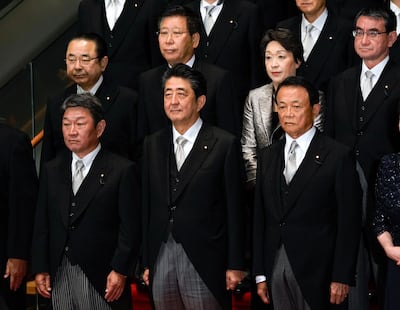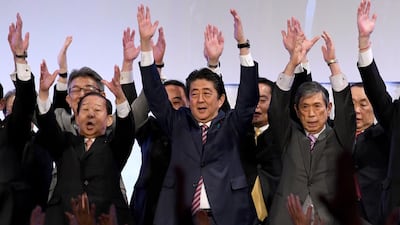Shinzo Abe today entered the record books as Japan’s longest-serving prime minister after completing 2,887 days in office. There are perhaps two lessons to draw from Mr Abe's long and successful – if somewhat chequered – political career. The first is that even a field as cutthroat and competitive as politics offers up second chances, and second is the fact that it is incumbent upon the recipient of that second chance to learn from past mistakes.
When in 2007 Mr Abe stepped down, somewhat unceremoniously, as Japan's prime minister following an inglorious year in office, few would have predicted a comeback for him was even possible, let alone him becoming his country's longest-serving head of government more than a decade later. No man (for it has always been a man) had returned to office since 1948 and the consensus 12 years ago was that Mr Abe had thrown away a golden chance to build on the historic achievement of becoming the youngest prime minister of post-Second World War Japan.
The blame for that failure cannot be laid entirely at his doorstep. He presided over a Liberal Democratic Party that was already unpopular at the time, resulting in embarrassing losses in the upper-house election. That said, he failed to keep his cabinet in order as ministers resigned over their alleged involvement in financial or election-related scandals. Mr Abe himself stepped down in ignominious circumstances, citing ill health. While he did overreach in his bid to pass an anti-terrorism law, the fact remains that he had little support within his own party back then.
But Mr Abe has benefited from a fair bit of fortune coming his way in the intervening years. Electoral reforms passed in the 1990s – especially with regard to funding laws – helped heal divisions within the LDP and centralised and consolidated the power of its leader. As a consequence of those reforms, the party headquarters gained more power in the selection of candidates for electoral districts, which meant that the loyalty of party members shifted from their factions to the central leadership. While factionalism had begun to dwindle even before the initial rise of Mr Abe, the party leadership became even more important during the revival of his political career. With few viable leaders emerging from within the ranks of the party following its electoral loss in 2009, coupled with the then government’s inability to rally people during the 2011 earthquake and tsunami, Mr Abe crafted his return to the helm in 2012.

His own portrayal of himself as a strongman, ready to make tough decisions to yank Japan back from two lost decades of economic stagnation, appealed to the masses as well as his base, tired of watching the conveyer belt of prime ministers in the preceding years. It hasn't hurt that he is part of a political dynasty, from a constituency that has elected to office four of Japan's longest-serving prime ministers. He is himself the grandson and grand-nephew of two former prime ministers.
Abe 2.0 has had his fair share of controversies, with cabinet members resigning during his second term in office, as they did during his first stint. One particular controversy even implicated his family. However, he has benefited immensely from a continued lack of a visible alternative as leader, not just in the LDP but in Japanese politics. He has managed to distance himself from many of these controversies while remaining defiant amid the opposition’s calls to step down.
His domestic successes, in the meantime, have included the passage of an immigration bill to make it easier for foreigners to find work in Japan, known for its historically closed and homogeneous society but currently wrestling with an ageing and shrinking population. His triple-pronged “Abenomics” – a comprehensive economic policy package to sustainably revive the economy while maintaining fiscal discipline – has got the wheels of Japan’s flagging economy moving again, even if only slightly. He personally campaigned successfully to bring the 2020 Olympics to Tokyo.
Meanwhile, he has carved a niche on the global stage and lifted perceptions of Japan in the eyes of the world. Even after US President Donald Trump withdrew from the Trans-Pacific Partnership, Mr Abe pushed the trade pact's other member-states to pursue a TPP-minus deal. This, as well as his success in rebuilding diplomatic ties with China – frayed in the early days of his second stint, thanks to conflict between the two nations over a string of islands in the East China Sea – has shown that he is a pragmatic leader who is willing to innovate, despite his own deep-rooted political conservatism and nationalism.

Mr Abe has much left to accomplish, of course. Two of the three prongs of Abenomics, including monetary easing and fiscal stimulus, have had fair to middling success. He has had a more difficult time pushing through structural reforms, especially in the agriculture sector, although among the tough decisions he promised to make, he risked making farmers unhappy with his attempts to limit the power of one particular national agricultural cooperative with plenty of political heft that was long opposed to the TPP.
More than anything else though, Mr Abe is likely to be remembered for his determination to revise Japan’s post-war pacifist constitution that bars its Self Defence Forces from waging war with another country unless attacked first. Mr Abe has yet to convince a reticent public that reducing its military dependence on the US, enshrined in a treaty with the superpower following the war, is the right way forward – not just to lift the morale of its people but also to prepare itself for the worst, given that the US itself is gradually losing interest in global interventions.
Mr Abe has two years left in his term as head of the LDP, and therefore prime minister, and it is yet uncertain whether he will continue beyond 2021. However, even if he is unable to secure his long-held dream of revising the constitution, he may have sown the political conditions for his successor to continue that battle.
In any case, his legacy as one of Japan’s most consequential prime ministers – at least on the world stage – is set in stone. His first term in office might have been forgettable but in his second, he has made the most of being given a second chance.
Chitrabhanu Kadalayil is an assistant comment editor at The National


